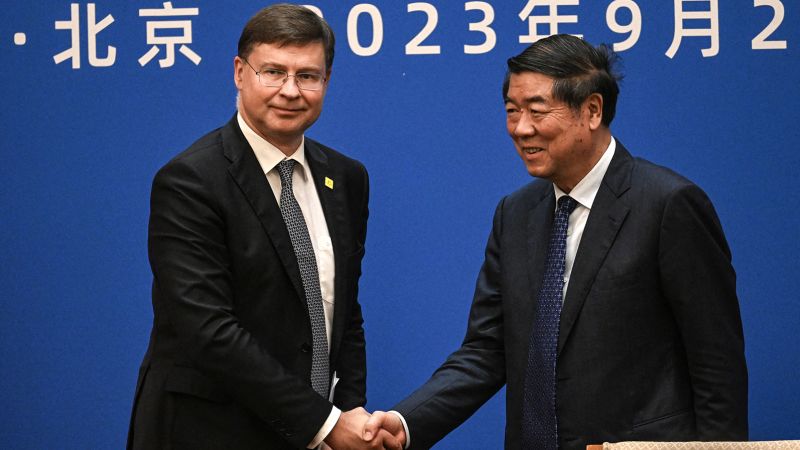Editor’s Note: Sign up for CNN’s Meanwhile in China newsletter which explores what you need to know about the country’s rise and how it impacts the world.
China and the European Union have agreed to exchange information on export controls as part of efforts to dial down tension over trade imbalances and geopolitical issues.
Europe’s trade chief said the relationship was at a “crossroads” and the bloc’s exporters needed better access to the world’s second biggest economy.
“Our relationship needs rebalancing to be mutually beneficial, based on transparency, fairness, predictability and reciprocity. I am glad that we made progress in addressing some market access issues,” Valdis Dombrovskis said in a statement.
The two sides also agreed to improve transparency on supply chains for raw materials and are considering a new “mechanism” to do so, the European Commission said in the statement issued Monday.
Dombrovskis is wrapping up a visit to Beijing, where he met with Chinese Vice Premier He Lifeng Monday. The two sides will work specifically on the flow of agricultural products and alcoholic beverages, while China has committed to clearing a “backlog of applications for licenses of infant formula,” the Commission said.
Following the meeting, He told reporters that China was willing to import more from the EU, and that it hoped Europe would remove restrictions on exports of high-tech products to China.
Bilateral ties have soured recently, especially after the European Union launched an investigation into China’s state support for makers of electric vehicles (EV) as soaring imports of its cars stoke fears for the future of European auto manufacturers. China’s commerce ministry called the investigation “blatantly protectionist” earlier this month.
Hours before meeting He on Monday, Dombrovskis said China’s trade practices have forced the European Union to become more assertive in its dealings with the world’s second largest economy.
“We stand at a crossroads,” he said in a speech at Tsinghua University. “We can choose a path towards mutually beneficial relations. One which is based on open, fair trade and investment … Or we can choose a path that slowly moves us apart.”
Last year, the bloc’s trade deficit with China hit 396 billion euros ($421 billion), which was “the highest in the history of mankind,” Jorge Toledo, the EU ambassador to China, was quoted by Reuters as saying.
Half of the deficit was in vehicles and machinery, while the rest was in other manufactured goods, chemicals and energy, according to EU statistics.
Vehicles have become a key sticking point as soaring imports of Chinese cars rattle European automakers.
Tensions have already strained tech supply chains. China recently slapped export curbs on two semiconductor materials in a warning shot to Europe and the United States, after they imposed restrictions on China’s access to advanced chipmaking equipment.
Meanwhile, European businesses have raised concerns about China’s operating environment, fearing it’s becoming more political and unpredictable, Dombrovskis said at a press conference Tuesday.
He said China’s position on the war in Ukraine was also affecting the country’s image, not just with European consumers but with businesses looking to invest.
“It is difficult for us to understand China’s stance,” Dombrovskis told reporters.
Moscow has become increasingly dependent on Beijing since its full-scale invasion of Ukraine in 2022, with trade between Russia and China soaring this year. China has insisted it is neutral, and only wants peace in Ukraine.
— Laura He contributed to this report.
Read the full article here










